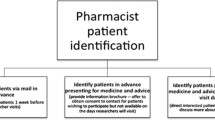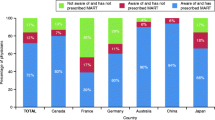Abstract
Asthma morbidity remains high worldwide despite the introduction of national guidelines for management and the increase in specially trained asthma nurses. Current interventions have not led to a demonstrable reduction in hospitalizations and emergency department visits in adult asthma. The role of the asthma nurse must include addressing issues of compliance as part of a more holistic approach to asthma management.
Previous studies have demonstrated that the asthma nurse can play a pivotal role in educating and supporting the patient in self-management strategies and the hospital setting has been shown to be an appropriate setting in which to target those with poor symptom control. Issues of compliance must be addressed within the domains of patients’ perception of their asthma, accurate assessment of prior knowledge, education to promote changes in behavior and appropriate self-management strategies, as well as giving consideration to influences such as culture on self-management behavior.
The asthma nurse is ideally placed to accurately assess and educate patients with asthma on how to manage their symptoms. However, education must be an ongoing process for both patient and educator. Any interventions offered must be based on up-to-date evidence with proven clinical effectiveness if improved long-term outcomes are to be achieved.
Similar content being viewed by others
References
National Asthma Campaign. National asthma audit 1999/2000. London: Direct Publishing Solutions, 1999.
Morice AH, Wrench C. The role of the asthma nurse in treatment compliance and self-management following hospital admission. Respir Med 2001; 95: 851–6.
Osman LM, Caulder C, Godden DJ, et al. A randomised trial of self-management planning for adult patients admitted to hospital with acute asthma. Thorax 2002; 57: 869–74.
Sudre P, Jacquement S, Uldry C, et al. Objectives, methods and content of patient education programmes for adults with asthma: a systematic review of studies published 1979 and 1998. Thorax 1999; 54: 681–7.
Grampian Asthma Study of Integrated Care (GRASSIC). Reducing hospital admission through computer supported education for asthma patients. BMJ 1994; 308: 568–71.
Mayo PH, Richmond J, Harris HW. Results of a program to reduce admissions for adult asthma. Ann Intern Med 1990; 112: 864–71.
Kotses H, Bernstein IL, Bernstein DI, et al. A self-management programme for adult asthma: Part 1. development and evaluation. J Allergy Clin Immunol 1995; 95: 529–40.
Wilson SR, Scamagas P, German DF, et al. A controlled trial of two forms of selfmanagement education for adults with asthma. Am J Med 1993; 94: 564–76.
British Thoracic Society. Guidelines for management of asthma in adults. BMJ 1990; 301: 797–800.
British Thoracic Society, National Asthma Campaign, Royal College of London, et al. The British guidelines on asthma management: 1995 review and position statement. Thorax 1997; 52 Suppl. 1: S1–S21.
Adams S, Pill R, Jones A. Medication, chronic illness and identity: the perspective of people with asthma. Soc Sci Med 1997; 2: 189–201.
Donovan JL, Blake DR. Patient non-compliance: deviance or reasoned decision making? Soc Sci Med 1992; 34 (5): 507–13.
Mulhauser I, Richter B, Kraut D, et al. Evaluation of a structured treatment and teaching programme on asthma. J Intern Med 1991; 230: 157–64.
Lahdensuo A, Haahtela T, Herrala J, et al. Randomised comparison of guided self-management and traditional treatment of asthma over one year. BMJ 1996; 312: 748–52.
Allen RM, Jones MP, Oldenberg B. Randomised trial of an asthma self-management programme for adults. Thorax 1995; 50: 731–8.
Underwood MF, Revitt SG, Field SK, et al. Patient education in asthma: impact of nurse educators. Dis Manage Health Outcomes 1999; 5 (6): 303–9.
Ronchetti R, Indinnimeo L, Bonci E, et al. Asthma self-management programmes in a population of Italian children: a multicentric study. Eur Respir J 1997; 10: 1248–54.
Madge P, McColl J, Patton J. Impact of nurse-led home management training programme in children admitted to hospital with acute asthma: a randomised controlled study. Thorax 1997; 52: 223–8.
Lilleyman JS, Lennard L. Non-compliance with oral chemotherapy in childhood leukaemia. BMJ 1996; 313: 1219–20.
Gibson PG, Coughlan J, Wilson AJ, et al. Self-management education and regular practitioner review. For adults with asthma. Available in The Cochrane Library [database on disk and CD ROM]. Updated quarterly. The Cochrane Collaboration; issue 4. Oxford: Update Software, 2002.
Jones A, Pill R, Adams S, et al. Qualitative study of views of health professionals and patients on guided self-management plans for asthma. BMJ 2000; 321: 507–1510.
Douglass J, Aroni R, Goeman D, et al. A qualitative study of action plans for asthma. BMJ 2002; 324: 1003–5.
Shim CS, Williams MH. Evaluation of the severity of asthma; patients versus physicians. Am J Med 1980; 68: 11–3.
Verscheiden P, Cartier A, L’Archeveque JL, et al. Compliance with and accuracy of daily self-assessment of peak flows (PEF) in asthmatic subjects over a three month period. Eur Respir J 1996; 9: 880–5.
Malo J-L, L’Archeveque J, Trudeau C, et al. Should we monitor peak expiratory flow rates or record symptoms with a simple diary in the management of asthma? J Allergy Clin Immunol 1993; 91: 702–9.
Adams RJ, Boath K, Homan S, et al. A randomised trial of peak-flow and symptom-based action plans in adults with moderate-to-severe asthma. Respirology 2001; 6 (4): 2997–304.
Turner MO, Taylor D, Bennett R, et al. A randomised trial comparing peak expiratory flow and symptom self-management plans for patients with asthma attending a primary care clinic. Am J Respir Crit Care Med 1998; 157: 540–6.
Kendrick AH, Higgs CMB, Whitfield MJ, et al. Accuracy of perception of severity of asthma: patients treated in general practice. BMJ 1993; 307: 422–4.
Ruffin RE, Latimer KM, Schembri DA. Longitudinal study of near fatal asthma. Chest 1991; 99: 77–83.
Kolbe J, Vamos M, James F, et al. Assessment of practical knowledge of self-management of acute asthma. Chest 1996; 109: 86–90.
Griffiths C, Kaur G, Gantley M, et al. Influences on hospital admission for asthma in south Asian and white adults: qualitative interview study. BMJ 2001; 323: 962–6.
Moudgil H, Marshall T, Honeybourne D. Asthma education and quality of life in the community: a randomised controlled study to evaluate the impact on white Europeans and Indian subcontinent ethnic groups from socioeconomically deprived areas in Birmingham, UK. Thorax 2000; 55 (3): 177–83.
Barnes PJ, Jonsson B, Klim JB. The costs of asthma. Eur Respir J 1996; 9: 636–42.
Suh D-C, Shin S-K, Voytovich RM, et al. Economic impact of an asthma education programme on medical care utilisation. Dis Manage Health Outcomes 2000; 8 (3): 159–70.
Acknowledgements
The authors have no sources of funding or conflicts of interest directly relevant to the content of this review.
Author information
Authors and Affiliations
Corresponding author
Rights and permissions
About this article
Cite this article
Wrench, C., Morice, A.H. The Effectiveness of Asthma Nurse Intervention. Dis-Manage-Health-Outcomes 11, 225–231 (2003). https://doi.org/10.2165/00115677-200311040-00003
Published:
Issue Date:
DOI: https://doi.org/10.2165/00115677-200311040-00003




